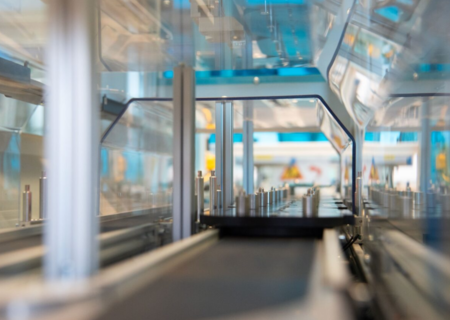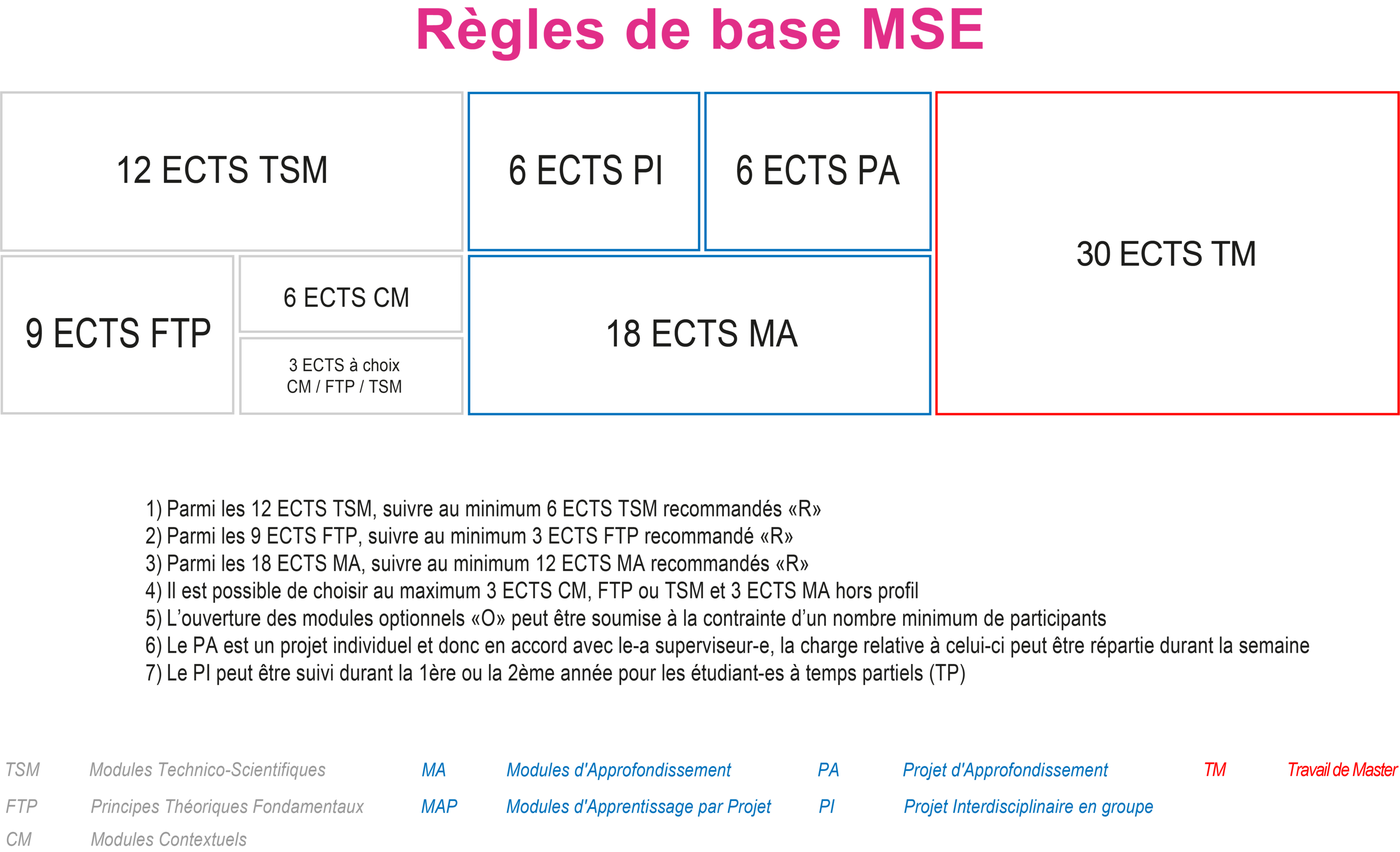The new MSE Energy and Environment (EnEn) profile has been created with the intention of training young engineers who are comfortable with all facets of the constantly evolving world of energy, while at the same time deepening the increasingly important interfaces with the environmental sciences, the framework of which is now a real societal requirement.
Concept
A broad array of knowledge around energy issues will enable students to develop and lead R&D activities at the cutting edge of the energy field, while also allowing them to develop a more holistic and focused view of all energy and environmental issues. Students will develop an inherently multidisciplinary skill set, drawing on electrical, thermal, and fluid dynamics, which they can apply to complex energy processes and systems.
In addition, this orientation of the HES-SO Master's degree aims to develop in parallel the ability to implement sustainable processes that integrate environmental protection in the broadest sense, in all industrial and service sectors.
Target group
The skills required to access this course are derived from any of the following bachelor degrees:
- BSc in Energy and Environmental Technology
- BSc in Electrical Engineering
- BSc in Electronic Engineering
- BSc in Mechanical Engineering or Automotive Engineering
- BSc in Materials and Process Engineering
- BSc in Systems Engineering
- BSc in Building Technology
The evaluation of admission skills is the responsibility of the HES-SO. Students who do not have the above-mentioned Bachelor's degrees will be assessed individually by the university of origin.
Professional profile
Graduates of the Master's degree in "Energy and Environment" will be qualified to work in the following areas:
- Industrial sector: Energy distribution and production enterprises, manufacturers of energy equipment (thermal, mechanical and electromechanical), industrial processes (chemical, pharmaceutical and food), control systems development, manufacture of cables and other high-voltage systems, production of sub-systems for renewable energies or the treatment of pollutants.
- Service sector: Engineering offices, integrators, umbrella organisations such as ASIG, SwissSolar, AEE Switzerland, AES or private foundations, hotel and distribution companies, large medical and social establishments, property management companies.
- Public sector: Energy and environmental departments of municipalities and cantons, public observatories, federal offices such as SFOE and FOEN, SBB and public transport companies.
Skills to be developed
The main objective of the training is to ensure that graduates can occupy a wide range of positions in industry, the service sector and the public sector, drawing on the robustness and diversity of the theoretical background acquired, as well as on the experience of laboratory activities and practical achievements.
Graduates of this Master's program will have a broad knowledge base in the fields of energy, environment and processes. They will have in-depth technical knowledge of electrical systems (electrical networks, electromechanical conversion, basics of power electronics), thermodynamics and fluid mechanics (mass and heat transport phenomena, thermo-mechanical conversion cycles, thermal networks, notions of exergy), the integration of energy storage (electrical, thermal and chemical), as well as environmental technologies.
On the basis of these skills, graduates will be able to deal with questions relating to both traditional and more recent energy production systems, as well as issues of distribution, conversion, storage and end uses. This systemic capacity is coupled with the consideration of material flows and their rational use, in a constant spirit of environmental protection, while taking into consideration economic and regulatory aspects.
Graduates will be able to analyse, describe, model, simulate, and then dimension, test, and commission complex energy systems involving several technical fields. For example, they will be able to participate in the development of new resource-efficient power plants, as well as renovate and optimise existing plants, incorporating the latest technologies. They will also be able to offer new services, such as combining energy and digitalization. Within a public service, they will be able to carry out territorial energy planning or energy efficiency actions at local and national level.
Finally, because of the multidisciplinary foundation of this profile, graduates will be comfortable working in diverse teams, as well as leading projects or participating in the management of companies active in this field. They will be recognised for their analytical skills and their pragmatic approach to decision-making.
Specialisations
As mentioned in the introduction, the Energy and Environment profile covers a very broad field.
- The generation of energy in various forms covers both new renewable energies - such as solar and wind - and more traditional technologies ranging from hydroelectricity to fossil fuels, including polygeneration.
- Energy conversion in electrical systems includes power electronics, high voltage and high current technologies, and electromechanical systems. From a thermal perspective, conversion technologies include heat exchangers, motors, heat pumps, cogeneration systems, chillers and fuel cells. In addition, there are various energy recovery technologies: waste combustion, heat recovery, etc.
- Energy storage systems, ranging from electrochemical systems to thermal storage technologies, as well as hydrogen, for both stationary and mobile applications.
- Demand side control to reduce energy consumption, as well as to define load shifting strategies, notably through smart meters, in a vision of future smart grids. In this framework, the concepts of prosumers and self-consumption communities are also included.
- Design, dimensioning, management, control and optimization of physical, chemical and biological processes, taking into consideration conversion technologies and their limitations, according to the three pillars "equilibrium", "balance" and "kinetics". To be able to provide this competence, the fundamental principles of mechanical, thermal and chemical processes and systems must be solidly mastered.
- Dynamics, modelling and control of complex systems, using modern data processing techniques and energy and exergy balance analyses.
- Material cycles, eco-design, techniques for recovery and valorisation of energy flows, including combustion and other thermo- or electrochemical processes, with a focus on energy and resource efficiency.
- Environmental techniques for sustainable management of air, water (including municipal and industrial wastewater), waste recycling and soil. This competence includes concepts related to the circular economy, life cycle analysis for all stages of value creation, and risk management.
- Determination of energy, environmental and greenhouse gas balances for all products, production processes, recycling and recovery processes throughout the life cycle.
- Understanding the legal and normative framework on environmental requirements, including an awareness of the role of innovation in this framework.
Soutien du canton de Neuchâtel
The canton of Neuchâtel supports students living in the canton.
For more details:
On the page https://www.ne.ch/autorites/DDTE/SENE/energie/Pages/accueil.aspx, see the block entitled FORMATION (conditions and application form).
Contact
Massimiliano Cappezzali
Head of the EnEn profile (major)
HES-SO Master
Av. de Provence 6
1007 Lausanne
T + 41 58 900 00 00
mse(at)hes-so.ch



